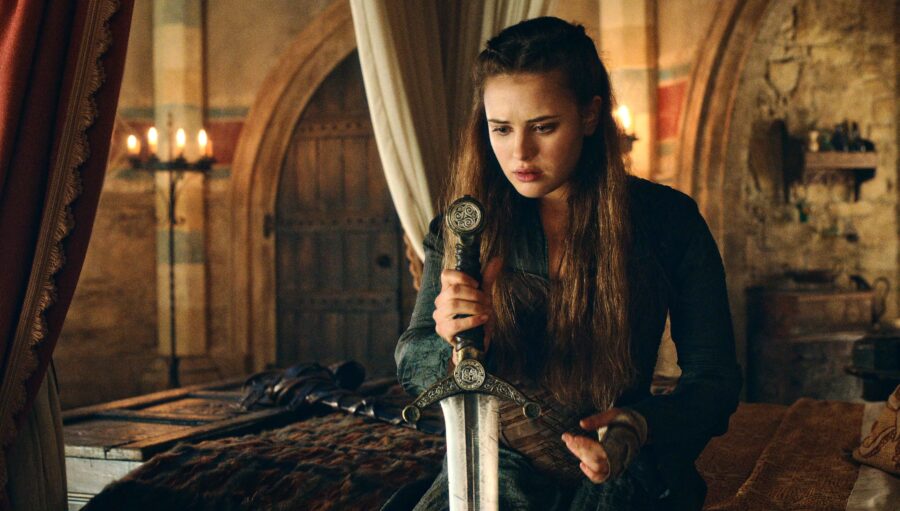Cursed Review: Netflix’s Fantasy Series Won’t Fill Your Game Of Thrones Shaped Hole
Cursed won’t fill the Game of Thrones-shaped hole in your heart.
This article is more than 2 years old

Creatives are fond of taking popular stories everyone knows, at least in passing, and telling them from a different perspective, from the point of view of another character, often a relatively minor one. Wicked puts a different spin on The Wizard of Oz, Maleficent tackles a new side of Snow White, Rosencrantz and Guildenstern are Dead give us an absurdist take on Hamlet through the eyes of the protagonist’s childhood friends. To a degree, Netflix’s latest high-fantasy series, Cursed, does something similar with the King Arthur legend.
Based on the illustrated novel by Frank Miller (Sin City) and Tom Wheeler (The Cape), Cursed, serves as a type of prequel to the core Arthurian tale, focusing on a young woman who ultimately becomes the Lady of the Lake. The premise basically boils down to: What if Excalibur (though they don’t really call it that here) chose someone before Arthur? It takes that idea and runs.
While the filmmakers obviously hope to fill the swords-and-sorcery void left when Game of Thrones wrapped up, the result watches more like a cleaned-up version full of angsty teen melodrama. Imagine The CW taking on George R.R. Martin’s epic and that’s a solid approximation. Not to say it’s bad, but everything is heightened and arch, aiming for a younger audience.

Cursed follows Nimue (Katherine Langford, Knives Out). Even amongst her Fey village, a people steeped in magic, she’s an outcast. Connected to dark forces, she’s called a witch and shunned and bullied and feared by those around her. Even her own father left when she was young. When the Red Paladins, a violent religious sect, slaughters her entire village, her dying mother tasks her with reuniting a magical sword with the sorcerer Merlin (Gustaf Skarsgård, West World). On her quest, she teams up with the mercenary Arthur (Devon Terrell, Ophelia) and has all manner of adventures fighting corruption, uniting the people, growing up, and realizing her destiny.
Overall, the first season of Cursed is an up and down affair. There’s plenty of enchantment and wonder to quench your fantasy thirst, and action to scratch that itch—the destruction of Nimue’s village features an impressive, elaborate battle filmed largely in a single take. Mechanically, it’s a gorgeous show. It uses beautiful natural scenery and seamless CGI backdrops create a wide, sprawling visual world full of magic, both dark and light. Some of the close up effects (especially where animals are concerned) don’t always hold up as well, but by and large, this is excellent work.
Plot wise, Cursed has a lot going on, a lot. At times, this adds a sense of epic scope and scale—this is, after all, a sprawling saga with multiple storylines threading through a complex world. Other times, it’s over-full and scatterbrained, the narrative loses sight of strands, and the entire series starts out unfocused. Even a handful of episodes in, the characters’ ultimate goals remain unclear—they react to the world around them rather than pursue their ambitions and purpose.

This re-imagining plays fast-and-loose with the source mythology. To be fair, this comes from Miller and Wheeler, but those with an affinity for all things Arthurian, should prepare for significant tweaks and changes in Cursed. As the tale begins, Merlin is a drunk with no magic powers to speak of. Arthur, though good at heart, trucks with a gang of brigands and rogues. We meet characters in one capacity, with one identity, only to learn they’re actually a character we’re already familiar with from the legend. Even then, they don’t always turn out as expected, given their identity. It can be fun to parse out, but will also surely vex a number of viewers. The narrative often relies too heavily on flashback to deliver backstory, which derails momentum for stretches.
Langford delivers a forceful heroine in Cursed, portraying Nimue as resourceful and tough, but also with much to learn about the ways of the world and who to trust. Skarsgård relishes in the depravity of his Merlin, intoxicated and devious, but with much more going on beneath the surface. Peter Mullan’s Father Carden, the vicious leader of the Red Paladins, is cold and sever. The primary antagonist, though occasionally chilling, he never develops into the terrifying figure he could have become.
Outside of these three, the rest of the cast is serviceable, though not particularly memorable. Terrell’s Arthur is little more than a pretty face and a ponytail, and Daniel Sharman plays the Weeping Monk, Carden’s rancorous right hand, as a kind of brooding goth mass murderer.

Especially at the outset, everything about Cursed looks too clean, too polished. These are people who live in huts, sleep on the ground in the woods, and work with their hands, yet everyone looks like they’ve bathed within the last 24 hours. Even characters portrayed as grubby, sweaty, and heinous are neat and tidy. Costumes are intricate and detailed, but clothes and fabric are crisp and new—apparently every character just bought an entirely new wardrobe at the same time. Nothing has ripped, nothing has faded.
It’s a similar situation with the Netflix show’s violence. Cursed is full of savage brutality—the Red Paladin’s crucify and burn people, lots of folks get hacked to bits with swords, entire villages get wiped out. Still, it’s a sanitized brutality. It’s PG-13 violence, where filmmakers can slaughter as many people as they want, but with relatively little blood. Death, at least early on, is relatively clean and toothless.
Details like these pull the viewer out of the reality the show seeks to create. As with most series, Cursed grows and evolves as it progresses, and it does improve in these areas. Nimue, Arthur, and the rest get grubbier as they go, costumes appear more lived-in, and even the violence ratchets up. It never fully becomes gritty and raw, but it does get bloodier, more realistic, and grow into the severity of fighting with swords.

Cursed won’t fill the Game of Thrones-shaped hole in your heart, but it’s a compelling distraction and offers a fantasy fix and charming high-adventure, all wrapped in a slick, sometimes too slick, package. It skews younger, for sure, which may affect your mileage. Ultimately it never dives quite as deep into the darkness as it could or should, but if you have a hankering for spells and spirits and intricate world-building, you can do worse than Cursed.












